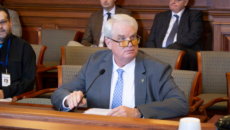Missouri’s medical cannabis program, established in 2020, has seen remarkable growth in just a few years. As of January 2025, over 120,000 Missourians hold medical marijuana cards, making up nearly 2% of our state’s population. The swift adoption of our medical cannabis program underscores the demand for alternative treatment options and the trust our citizens place in cannabis as a legitimate medicine.
However, despite these advancements, cannabis remains classified as a Schedule I substance under federal law, alongside drugs like heroin and LSD. This designation not only hampers research but also restricts access for patients, especially our veterans, who could benefit from its therapeutic properties. That’s why I support rescheduling cannabis to Schedule III and am thankful to see that President Donald Trump also endorses this move.
If cannabis is not rescheduled, scientists will continue to face burdensome red tape when trying to better understand cannabis’s full medical potential. As it stands, researchers have to apply for special licenses and are limited as to where they can source their cannabis from. This means that their studies are hindered, which in turn prohibits patient access.
Cannabis has been proven useful to people facing a myriad of conditions, such as epilepsy, chronic pain and PTSD, significantly improving the quality of life for many patients when traditional medicine failed.
Rescheduling cannabis would greatly benefit veterans, who are at high risk for PTSD; however, despite the fact that we know cannabis-based treatments are great alternatives for our heroes, those who receive their care through the VA are not allowed to even discuss these treatments as an option because of the federal classification.
Those who have bravely served our country deserve access to treatments that are proven to be effective in treating their ailments. Managing chronic pain, anxiety and other conditions through cannabis-based treatments could mark the difference for so many who come home still bearing the effects of war while adapting to civilian life.
It is also important to note that rescheduling cannabis is not a call for legalization. Cannabis should and will continue to be regulated just like other substances. This is a call for increasing patient access and expanding medical research.
With President Trump and many other leaders already on board, leaders in our federal agencies should hesitate no longer. In Missouri alone, we’ve seen the positive outcomes of a regulated cannabis program. Rescheduling cannabis at the federal level would amplify these benefits, ensuring that all Americans have access to safe, effective treatment options.
Let’s move beyond outdated policies and embrace a future where medical cannabis is recognized for what it truly is: a vital component of modern healthcare.

State Representative, District 103











